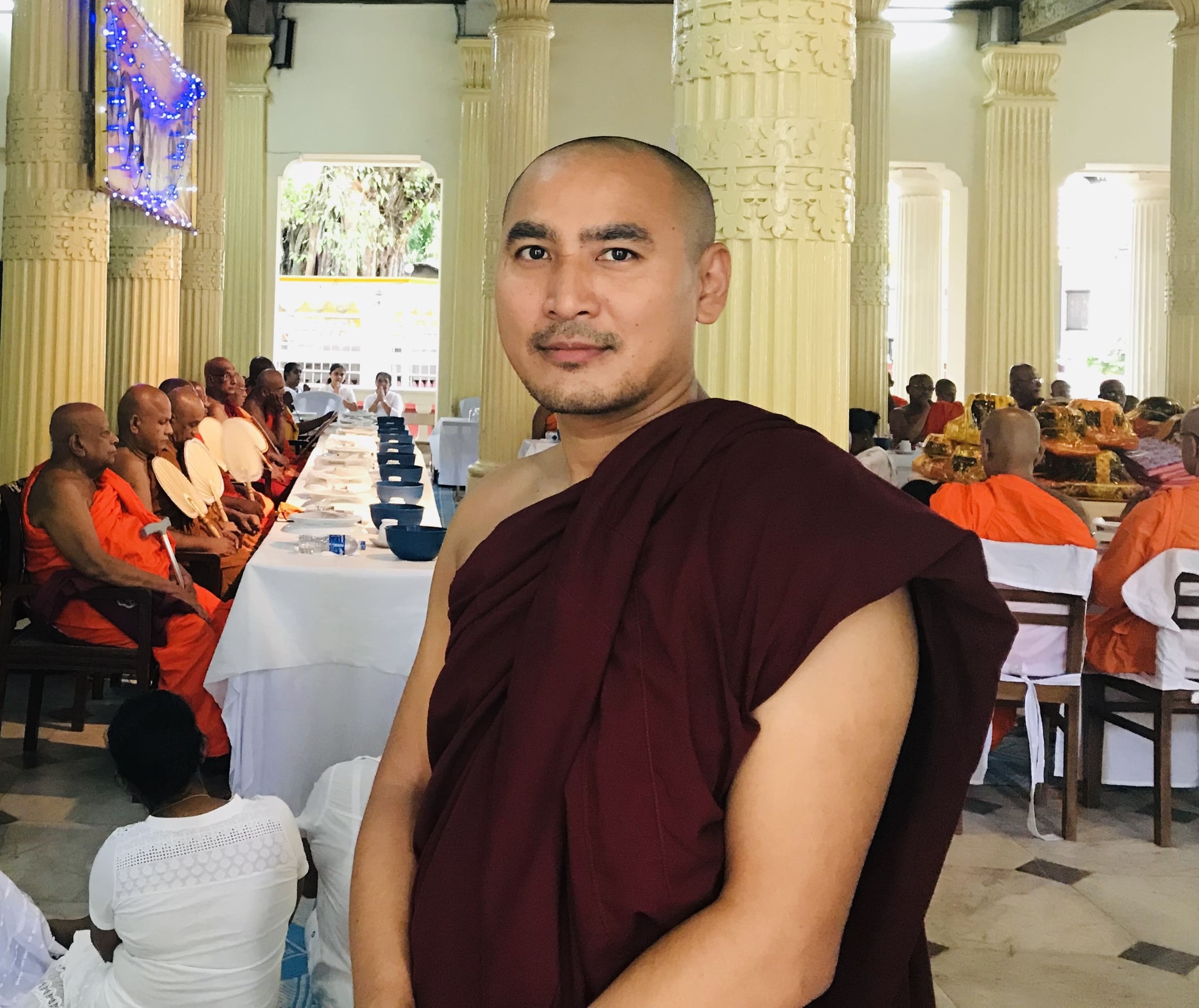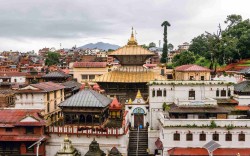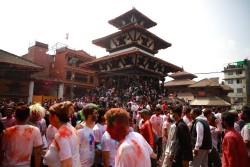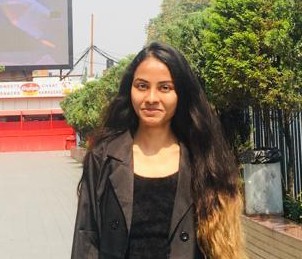Culture

Bhikku Chandima is a Buddhist monk living in Sri Lanka. This article is the monk’s first-person account shared with NepalMinute.
I was born in Balambu, Chandragiri on May 8, 1985. I was called Ishwor Nanda Maharjan before I became a monk.
I first turned into a Samanera, a name for a child monk. Then my name was changed to Bhikku Chandima, a compulsory step in the process of becoming a monk.
In my childhood days, I was very naughty. I don’t remember if I had any dreams but I read in a public school near my house up to grade 7.
Monkhood
My mother used to go to a Pranidhipurna Maha Vihar near my house to work as a devotee when I was a child.
Guru aamas or the Anagarika living there used to like my mother very much. My mother learnt from them that an institute in Sri Lanka was looking for a few monks.
Back at home, my mother shared with us what the guru aamas had suggested: sending me to Sri Lanka. My father didn’t know much about this all. He wasn’t convinced. I was their only son. Still, my mother somehow convinced him.
I was very excited to hear that I was going to another country even though I didn’t have much idea about what was in store for me.
I was excited for the chance to study abroad, all free of cost.
After that pictures of 20 children were sent to the institute in Sri Lanka.
Soon, I learnt that I had been chosen, with another boy from Nepal.
Thus, I became Samanera in December 1998.
To be a Samanera, we have to have a guru. If a monk doesn’t have a guru, it will be difficult for the individual to be accepted as a monk.
Then we have to get the parents’ approval and the approval of Buddha's Dispensation.
My guru in Nepal Vineetha Bhante, who lives in Patan, helped me to get here.
Seven days after that, I came here to Vidyodaya Pirivena, a monk institute in Colombo.
Sri Lanka
Once I came here, I realised this life was very different from the one I was living in Nepal.
At first, it became very difficult for me to adjust. I had to speak in English with everyone as I didn’t know the Sinhala language.
The institute, Vidyodaya Pirivena, was very strict. I had to do everything on my own and most of the time I used to miss my parents.
Slowly I got used to this all.
When I was 19 years old, after 6 years of becoming a Samanera, I came home to Nepal for the first time.
Coming home was different as well. It was hard again. I felt as if I had forgotten my mother tongue, the Newari language.
Family and relatives told me about the differences in my language and demeanour.
If not English, I had to talk in the Sinhala language while I was here in Sri Lanka. I used my mother tongue on no occasion.
I still understood the language but I wouldn’t be able to reply.
It took me two months to slowly start to speak my own mother tongue.
Still today I find it difficult to properly address elder people in my language.
In May 2008, I became a full Bhikku, an adult monk.
A Samanera will be considered for the Upasampada or higher ordination as a bhikku after we are 20 years old.
The second time I went to Nepal was after I completed my 12th grade.
After I completed my studies I started to visit Nepal every year.
Normally, I visit Nepal around Baishak Purnima.
I have celebrated Dashain with my family only two times. It was in 2016 and 2019. But as monks, we don’t put Tika -- I just join the families and relatives in other festivities.
Graduation
In the monk institute, we have to learn Pali and Sinhala languages and the Buddhist religion.
I completed my studies here and after graduation, my guru, Balangoda Sobitha Nayak Bhante asked me to work here.
I agreed and in 2014 I started to work as one of the staffs of the institute.
Currently, I am working as a hostel warden and super adviser of the institute.
In my institution, there are around 200 monks out of which 40 live in the hostel and others come from outside the institute.
I look after the Samanera living here in the hostel. I teach them discipline and see whether they are following the routines or not. If they are sick I take them to the hospital.
Punishment
Like normal people, monks are punished if they fail to follow the rules. They have to wake up in time and do everything in a disciplined manner.
If they are found not following the rules they are asked to clean the washroom or the Vihar Premises.
I have also got a couple of punishments when I was small.
I wasn’t a morning person so it was very hard for me to get up early in the morning due to which I got punishments a few times.
In case of theft, a monk found involved in it is banished from the Vihar.
For punishment on other crimes, monks would be sent to the police.
Crisis
The condition isn’t good right now. We aren’t getting as many donations as before. People now give us limited donations due to the ongoing crisis.
Fuel is very expensive here due to the current situation.
Earlier, we would get a free ride on tempos or public vehicles. A seat would be there for the monks as a mark of respect.
But nowadays the drivers suggest we should not travel by these vehicles as there won’t be any seat available for them because people are forced to travel by sitting on the roof of the vehicles.
It’s a lot worse in the village than in Colombo.
Few Bhikku went back to Nepal during the crisis because they couldn’t go to school.
It used to cost 500 rupees to travel one kilometer in a taxi before the crisis but now it costs 2000 rupees and to travel 3 kilometers it costs 5000 rupees while it used to cost only 1000 rupees.
It’s been more than a month since the government closed the school due to the fuel crisis.
There is also a shortage of medicines in government hospitals due to which we have to get them at double the price from a private hospital.
We haven’t eaten wholesome foods in the last 2 months.
Monk’s life
People often ask many questions about Buddhism that confuse us.
They usually ask questions about lord Buddha’s birth and how did he walk seven steps after birth.
Looking at the people who are living a normal life, I find it very difficult even when seeing them. In a monk’s life, there isn’t stress or tension.
We live in a discipline and I have been living here as a monk for more than 24 years now.
So, I feel like the life of a normal person is very difficult in comparison to how I live as a monk.
Future plans
My plan is to go back to Nepal. Right now I can’t leave the place because my 70 years old guru is very sick and I have to look after him.
Hopefully, at the end of 2023, I can leave Sri Lanka and go back to Nepal.
There I would want to make people understand the meaning of life.
People don’t know what real life is like as they have not much of an understanding of Buddhism.
With the help of meditation and other religious knowledge, I want to help them get peace in their life.

1679038049.jpg)




